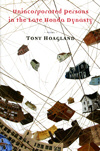Unincorporated Persons in the Late Honda Dynasty
One lingering aesthetic argument posits that popular culture has no place in poetry – that by adding references to current movies, TV shows, or common-day jargon – to things as disposable as Styrofoam or SpongeBob – the poetry itself runs a risk of becoming outdated, or perhaps worse, inevitably obscure. But what ultimately matters is how skillfully the poet chooses to use his or her referents. Tony Hoagland is particularly adept at incorporating pop culture into his poems. Like one of those jugglers who keeps their audience on edge by tossing knives into the air, Hoagland regularly risks injury as well as insult, often with dazzling results. Even the less successful of Hoagland’s poems are better than average; what they might lack in verbal oomph they make up for in readability, and what they all evince is a sincerity of emotion and purpose that is as rare in modern literature as it is thoughtful.
One lingering aesthetic argument posits that popular culture has no place in poetry – that by adding references to current movies, TV shows, or common-day jargon – to things as disposable as Styrofoam or SpongeBob – the poetry itself runs a risk of becoming outdated, or perhaps worse, inevitably obscure. But what ultimately matters is how skillfully the poet chooses to use his or her referents. Tony Hoagland is particularly adept at incorporating pop culture into his poems. Like one of those jugglers who keeps their audience on edge by tossing knives into the air, Hoagland regularly risks injury as well as insult, often with dazzling results. Even the less successful of Hoagland’s poems are better than average; what they might lack in verbal oomph they make up for in readability, and what they all evince is a sincerity of emotion and purpose that is as rare in modern literature as it is thoughtful.
Hoagland’s fourth full-length collection, Unincorporated Persons in the Late Honda Dynasty doesn’t divert from his usual formulations. (If it ain’t broke, don’t fix it.) Few poems exceed a single page; stanzas from one to five lines are the norm; and yes, popular culture looms large in the design. Perhaps the most blatant example of the latter is “Poor Britney Spears.” If ever there was a title to scare off the high society snobs, this is it. However, Hoagland’s poetry – and arguably, his entire raison d’être – is based on a kind of prestidigitation, where the author draws your attention to one thing while working his discreet magic to create an unexpected end result. “Poor Britney Spears” begins, mock-frankly apologetic:
is not the beginning of a sentence
you hear often uttered in my household.
If she wants to make a career comeback
so her agent gets a spot on the MTV award show
but she can’t lose the weight beforehand
so looks a little chubby in a spangled bikini
before millions of fanged, spiteful fans and enemies
and gets a little drunk beforehand
so misses a step in the dance routine,
making her look, one critic says,
like “a comatose piglet,”
well, it wasn’t by accident, was it?
That she wandered into the late-twentieth-century glitterati party
of striptease American celebrity?
Hoagland primes his poem’s readers for an extended junk culture backhand, starting with his own admission that any professed pity for the titular pop tart is not often uttered on his turf. Yet after the first five stanzas comes the patented Hoagland turn – a shifting away from the expected direction, and down a different path:
First we made her into an object of desire,
then into an object of contempt,
now we want to turn her into an object of compassion?
Are we sure we know what the hell we’re doing?
What’s great is how Hoagland takes the whole issue of objectification, and its inevitable sociological/sexual baggage, and plops it onto our plates. Do we know what the hell we’re doing? Why vent either our fantasies or our frustrations over poor Britney Spears? Hoagland is that rare writer who effectively shudders at Spears’s cultural cache, yet also genuinely feels a fatherly compassion for her wobbly place in the universe – as well as defensiveness against the indifferent powers that put her there – a split-personality that is evinced in the poem’s closing stanzas:
with one of my voices I shout, “Jump! Jump, you little whore!”
With another I say,
in a quiet way that turns down the lights,
“Put on some clothes and go home, Sweetheart.”
Other motifs occur across Unincorporated Persons in the Late Honda Dynasty‘s three sections: aesthetics (“Description,” “Hard Rain,” “Jazz”), race (“Expensive Hotel,” “Hinge,” “Foghorn,” “The Story of White People”), family (“My Father’s Vocabulary,” “Sentimental Education”), desire (“Romantic Moment,” “Love,” “Visitation,” “Not Renouncing”), consumerism (“Food Court,” “Big Grab,” “Plastic,” “At the Galleria”), and death (“Confinement,” “The Story of the Father,” “Rhythm and Blues”). But these are randomly applied modes of organization – many of these poems are thematically cross-pollinated, resisting easy categorization, and that complexity makes reading them a treat for both heart and mind.
Tellingly, Hoagland’s unostentatious titles – such as “Poor Britney Spears” – are just the tip of the iceberg, with much more to discover if you’re willing to dive beneath the waterline; and once you do take that plunge, you’re rewarded with playful language that is complex without being stodgy, smart, maybe even smart-ass at times, but never pejorative or condescending.





